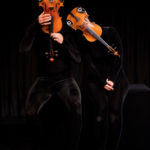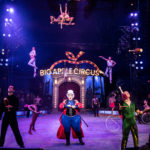
Disclosure: I attended a screening and press junket hosted by 20th Century Fox. I was not paid to write this post.
It’s so crazy that two weeks ago I knew very little about Phineas Taylor Barnum. I knew he started the circus I grew up with, but little more. Since seeing the upcoming Christmas motion picture “The Greatest Showman,” I have thought little else but this man, his life, and the story that inspired this beautiful new movie, which is fortunately a musical but not just a musical. He was not ony a brilliant business man, but he was a family man and he inspired all the people he put into his shows. He celebrated their differences like no one else had before, and for that reason, the film is a treasure. The music is not only sublime and simply unforgettable but its words also celebrate differences and promotes tolerance and acceptance. This is the kind of music you don’t let yourself stop listening to, and I haven’t. It’s meaningful, thought-provoking music and it comes from the heart.
There is just so much to talk about with this film, and I was so fortunate to be a part of a small group of bloggers who got to meet some of the cast and crew. It was a snowy Saturday afternoon in New York City, and after seeing the film the night before, nothing was going to stop me from attending this junket. I had so many questions and I was eager to speak to the creators of this film.
The story itself is bold and brave..and big. It’s about Barnum’s life, when he was a small boy to just starting out as a businessman, and about all the people he met and loved along the way. It stars Hugh Jackman as Barnum, Michelle Williams as his wife, and a stellar cast of both theatrical and musical talent that includes Zac Efron and Zendaya. The songs were written by the genius team behind “Dear Evan Hansen,” Benji Pasek and Justin Paul. The director is a first time filmmaker, Michael Gracey, which is crazy but true – it’s his first film.
We kicked off the junket with Jackman, Efron and Zendaya, who play three of the film’s most important characters. Jackman and I chatted about shoveling snow in Larchmont (seriously!) and then he talked about the pull of this film: “They had this idea of P.T. Barnum, which I thought was perfect for a musical. I do think when you have a character who’s in the world of show biz, who’s larger than life, it lends itself to a musical. So, in that way, I thought this is a perfect type of character.” Efron, who plays Jackman’s sidekick, chimed in and talked about his love for musicals:”I”m always looking to find the next way to integrate music and that sort of song and dance side of me into my work. And in Hugh’s portrayal of P.T. Barnum, I felt like it would be effective. It could work through–Phillip could be a conduit to help show the magic of what P.T. Barnum did as a showman. And really, what Hugh does as a person in real life, and I’m here at a standing testament to it, he’s, one of the best teachers and showmen in the world. He quite literally is the most versatile probably actor alive. He’s always exuding this positivity and uplifting attitude. And I think it shows in his work, and it’s definitely in his work process.”
Efron and Jackman clearly have chemistry in real life, which translates to the big screen as their characters in the film are not only business partners but friends. They have one dance and music number in the film which is quite memorable, and it looked challenging to execute. About the scene, Jackman said, “We did a lot of hat stuff, glass stuff, and I’m clumsy. And literally, I would put my hand there and–20 feet, the shot glass was always there.” Efron, who clearly learned a lot from Jackman during the production of this film, chimed in and told Jackman, “It was fun to watch you figure it out, because you’re dealing with catching a hat on your foot and then flicking it back to your head. I’m, like, just sitting there in awe for half the numbers.”
Zendaya, who plays a trapeze artist in the film, as well as Efron’s love interest, spoke about how she and Efron did most of their stunts on their own, which is pretty amazing. Once you see the film, you’ll understand. “She said “I have a partner in crime (Efron) who wanted to doit just as much as I did, I mean, because when it comes to that, and it’s easy to get frustrated. We were constantly pushing each other.” He said it was a testament to Zendaya: “She was totally committed. And once we kind of trusted one another, she just kept leveling it out, and that just made me that much more motivated to get it perfect.”

The film celebrates people’s differences in an extraordinarily powerful way. “I love the message of this movie, of accepting ourselves for who we are and what we love and the things that really make us feel passionate and not worry about what anyone else thinks,” Jackman said. “Owning up to the things that you love, the music that you like, the food you want to eat, who your friends are, the things you want to do whether it’s cool or not, that is where the joy of life is.” He told us a story about growing up in fear of his talent, and how his older brother used to make fun of him for wanting to be a dancer/singer until he was 18 and his family went to a production of “42nd Street”. That day changed everything. His brother apologized and told him he belonged on stage. But Jackman doesn’t tell his kids to be like him: “Be more like Billy Elliott. Just do the thing you love to do because it makes you happy. And if you follow that path, you will make other people happy.”
Efron, whose first musical was “High School Musical,” a film we have watched dozens of time in my house, said, “I wake up and every day start with the man in the mirror, and just have to accept that and be excited about that.” Zendaya takes her role as someone who young people look up to very seriously: “We’re not saying this is how you should be. It’s saying we want you to be the best version of yourself. So, nobody’s saying I want you to be just like Zendaya. No, I don’t want you to be just like me. I want you to be just like you. That path looks different for every single person in any walk of life.”
The film was a first for many of its actors. Rebecca Ferguson, who plays Jenny Lind, a singer from Sweden who Barnum takes under his wing to make famous, and whose voice is remarkable, had never done a musical before and said, “I was terrified of going into this genre and that I was going to play one of our cult figures of Sweden. I’m not really a singer; bring on more terrifying. And I thought why not just do it and challenge myself?”
Keala Settle, a Broadway actress, plays Lettie Lutz, the circus’ bearded lady, and she’s a complete break out. You will never forget her performance. She said she at first shied away from the role: “I was so petrified because this is my first major motion picture in a role that I didn’t know was going to be what it is. The bigger that it got for me, the scarier that it got because I wanted to hide even more. And I am still, even sitting here in front of you, fighting that right now.” Settle, who was starring in “Waitress,” when she got this role, sings “This is Me,” one of the strongest numbers in the film about celebrating differences. She apparently brought director Michael Gracey and the composers to tears during her final audition when they offered her the role: “I thought it was a lie and I said, ‘I can’t wait for my $500 for doing this reading, and then I’m going to go back to work at “Waitress!'”
As for Gracey, how on earth is this his first film? Very humble, he refuses to take all the credit: “Clearly I would love to take credit as the director for the amazing performance, but I can’t because everyone involved in this film, they brought so much to their performance and they did it in a way that was so truthful. This cast and this set and the crew created the most amazing environment, and it was such a sense of family with everyone. You had huge stars coming down and just being on set to support other people’s musical numbers. You know, like they were cheering and usually when you work with big stars, you’re like you have this person from that time to this time.”
He continued: “And they all did it. Zac, Zendaya, Hugh, they all come down. Everyone was so enamored with each other and what they were bringing to this film. And that’s really what makes it so special.I had crew who have done 40, 50 films coming up to me and saying I’ve never been on a set like this.”
Settle agreed that the experience of being in this film was very powerful, and that energy and vigor added to her performance: “You can’t lie on camera because they can see it. You can’t lie. There are moments of being on a Broadway stage which are different, and it’s a different way you perform and share those emotions that you can convey to that type of an audience.You have to tap in. And the second that you let all of that go, you’re not even in your body anymore, which is how it’s supposed to be, because you have to let others see what has, that’s what makes a great artist, when they can give of themselves enough to say I’m getting out of the way so that this can come through, wherever it came from.”
The story of Barnum is fascinating, and I wanted to hear Gracey’s point of view of bringing it to life and dealing with some pretty tough issues in his film: “Something that I found really fascinating was his support of civil rights, and he was a huge advocate. I really wanted to reflect that in the film. At the time, seven years ago, I thought it was still relevant to this day. And sadly, it became increasingly relevant over the seven years of developing it. Then, I cast Zendaya, who–I just find her incredible, but she had a lot to say about her own experience with mixed race parents. And so, I think it was a combination. It was a combination of writing the character, of casting Zendaya, writing more with her in mind. So, that’s kind of how the evolution of that love story came about.”

Ferguson chimed in, who clearly has a love for Gracey’s work: “I think it fits beautifully as well. It’s a film about not minorities, but class difference, breaking down the barriers of class, breaking down these goddamn walls of racism and putting it in this triumphant film with incredible songs.”
Naturally, the topic of politics and gender equality came up. Settle was the first to comment: “The high road is so clear and available and traffic free right now. I challenge you to take that, and take that highway that’s up there that has no cars on it. I challenge you to because that’s what we did with this film.”
The composing duo Benj Pasek and Justin Paul wrote the movie’s songs. Their songs from “Dear Evan Hansen” and “La La Land” have swept me away over the past year, so meeting and hearing from them was a dream. When they were hired to work on this film, seven years ago, they were just starting out. Paul said, “The first time that we heard anything about this film was we heard Michael Gracey, the director, pitch the film. He had been sort of going around to a lot of songwriters, most of whom were a lot more well-known and established than we were. But someone, you know, convinced him and cajoled him to talk to us. We heard him tell this tale of how he wanted to make a film, sort of like the film that P.T. Barnum would have made about himself, this sort of larger than life figure who was an impresario, who was sort of the Steve Jobs of his time, the Jay-Z of his time, was sort of like the OG. The part of that concept was, you know, I want to make the music contemporary and the choreography contemporary to, like, sort of set–talk about the fact that he was ahead of his time. And that sounded sort of crazy to us, and we were like, ‘We don’t get that at all.'”
But eventually they did. Pasek, who writes the words primarily while Paul writes the music, said this about their process: “I think that once music and lyrics are paired together they can’t really be separated, ideally. We like to take credit for both things because a song is really a united, you know, congealed piece of something that you can’t really separate. Sometimes the melody has to get out of the way to just support a lyric that you really want to be heard. And so, we just try to work as closely as possible.”

The cast at the NYC premiere.
On working with Gracey, Paul said, “Michael would show us concept art. Michael is big into pre-viz, pre-visualization, so, like, almost computer animation of what the scenes would be. And those really inspired us in writing the songs. But then once the songs were written, the team really took those and ran with them and staged them in that beautiful way.”
The song “This is Me,” came up because, well just because. Once you hear the song, you’ll understand. It will never leave your mind. Pasek told us, “That song was really inspired by the character. Everything for us starts with character, so the character of the bearded lady and these oddities, these people who have, you know, grown up living in the shadows who have been, you know, locked in their parents’ basements or attics and never really been sort of let out, and have been told their whole lives that they should be embarrassed about who they are. Originally the song was written for Tom Thumb, and it was kind of a–how would you describe it? It was like a little ditty.”
But Gracey pushed for something bigger. Paul said, “The song kind of came out of a lot of fighting back and forth with us and Michael.” Pasek added, “Letty was being played at that time even in workshops by Keala Settle, who we knew from the Broadway world and who we felt really lucky to be developing this with. When we began to think about it in her voice and what her voice is able to do and also what–you know, what she brings to the table, just who she is as a human being and it began to really click for us about what the song could be.”
When asked about his research for the film, Pasek chimed in about his own personal connection to Barnum: “I also had the rare distinction of having done a fourth grade report at the Barnum Museum in elementary school, so I’m sort of an expert. I grew up in Connecticut, maybe 20 minutes from the Barnum Museum in Bridgeport, Connecticut. And so, there’s actually a really, really hilarious, like, dweebie video of me and my friends when we’re, like, in fourth grade at the Barnum Museum doing a full book report. So, the book report really–or the character report, I guess, really came in handy. But, we did do some of that research especially in sort of like the kind of phrases he would use and all that kind of stuff. But then ultimately, the movie is sort of a storybook version of his life.”

Source: L.A. Times
Pasek and Paul told us about their influences, ranging from Ingrid Michaelson to Billy Joel to Imagine Dragons, how they actually wrote the opening number “The Greatest Show” with Ryan Lewis of Macklemore and Lewis because Gracey wanted it to be a show stopper of total Steve Jobs impact, waiting for the iPhone and all the people just needing this thing. Pasek told us, “It was a cool assignment, in a way, because really the assignment from Michael was I want these songs to feel contemporary. And so, that was something a little bit different.”
Fortunately for us, Pasek and Paul’s cool assignment is “The Greatest Showman,” and it’s sure to be one of your favorite movies of the year and possibly favorite musicals of all time.
This Christmas, dare to dream anything. The #GreatestShowman opens a world of imagination, in theaters December 20. TheGreatestShowmanTickets.com.







 Follow
Follow





Speak Your Mind